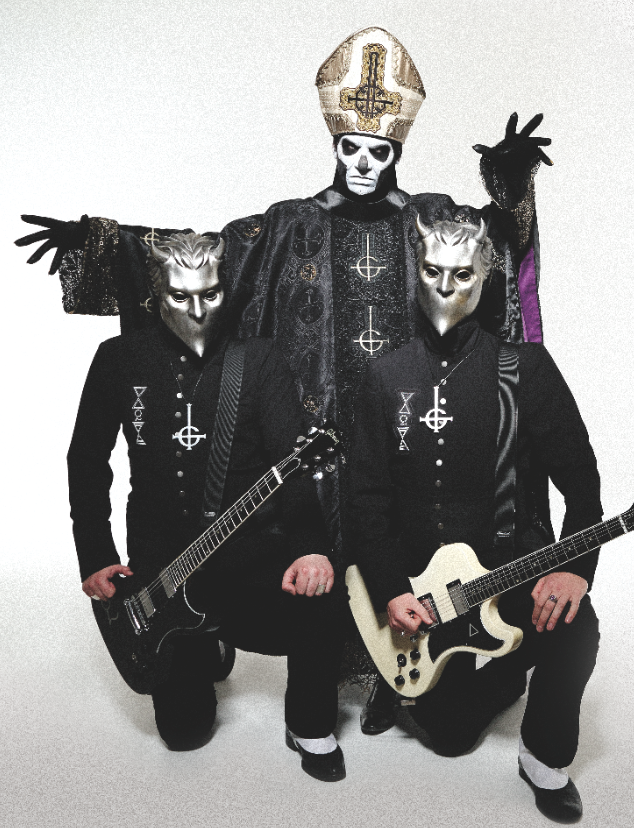Nameless Ghoul Talks Ghost's New Album, 'Meliora,' and Staying Anonymous

When Guitar World catches up with Nameless Ghoul, one of five similarly monikered members of Ghost, he's relaxing at his home in Linkoping, Sweden, in anticipation of a round of live gigs with his band. Apparently, even ghouls need rest sometimes.
But the fact is that the guitarist and his fellow ghouls have been quite busy as of late, as Ghost recently completed work on their third full-length album, Meliora (there’s also the issue of the band announcing yet another new singer, Papa Emeritus III, who, as coincidence would have it, looks and sounds exactly like his forerunners, Papa Emeritus and Papa Emeritus II—read into that what you will).
The new album follows two well-received full-lengths, 2010’s Opus Eponymous and 2013’s Infestissumam, as well as the Dave Grohl–produced, ABBA cover-featuring 2013 EP If You Have Ghost.
Much like its predecessors, Meliora is a fuzzy, doomy, Satan-y slab of prehistoric-sounding metal that also reverberates with pop hooks, churchy organs, gothic choirs and the almost unnervingly smooth vocals of Papa III. The result is a wild, theatrical and blasphemous ride.
Opening track “Spirit” pulses with impending dread, while “From the Pinnacle to the Pit” rides a bloated, distorto-bass line all the way to hell. On the other hand, “Spoksonat” is a gently picked, classical-tinged instrumental piece, and “He Is” is a pastoral-sounding paean to “the beast with many names” that explodes into a soaring, Technicolor chorus.
Then there's “Absolution,” which rumbles forward on a Metallica-esque verse guitar riff (if Metallica had formed in 1973 rather than 1981, that is) but at some point veers off into a middle section that resembles something like Journey, as interpreted by Styx.
The whole thing is ominous and odd, but also strangely enveloping—even while Papa III is crooning lines like “The world is on fire and you are here to stay and burn with me.” Or, as Nameless Ghoul puts it, “We’ve always wanted to create something different. I’m not saying it’s better or worse, it’s just our own mindset.”
Get The Pick Newsletter
All the latest guitar news, interviews, lessons, reviews, deals and more, direct to your inbox!
In the following interview, the guitarist discusses the making of Meliora and the themes explored within its songs. He also sheds light on Ghost’s ambitions, how it feels to be a Nameless Ghoul, and just how he and his equally nameless co-guitarist achieve the incredibly warm, vintage tones that are a defining aspect of the band’s sound. Hint: It has something to do with two ghouls, four guitars and a dozen different amplifiers.
Was there a particular direction you were looking to go in on Meliora?
Yes. There were a few guidelines we were working off of. The main one was that we felt on Infestissumam there was definitely a shortage of…I don’t know what the word is…let’s say riffage. Whereas that was not the case on the first one [Opus Eponymous]. So we wanted to make a record that had more riffs on it, because the guitar took a bit of a backseat on Infestissumam.
And the main reason for that was the production. The guitars were just put in the back. If we were to take all the tapes from that album and go into a different studio and remix the whole thing I’m sure it would sound very different. So this time we wanted to focus on the guitar aspect from the start.
Secondly, from a thematic standpoint we wanted the whole record to have something of a futuristic feel. So there are organs and things like that, but there are also other things that we excluded, because this is not, you know, our medieval record. This is our futuristic, urban-dystopia-metropolis record. So we knew it had to possess a certain sort of flair.
Because if you want to make a futuristic record that is sort of Eighties-sounding, you would do that by using a lot of chorus everywhere. But that’s not what we were trying to do. Or you could make a Judas Priest or Iron Maiden–style record that sounds very futuristic. But that’s not what we were trying to do either. Sometimes you have to know what to leave out.
It’s interesting that you were going for something futuristic with Meliora, considering that there’s always been such a strong vintage feel to everything Ghost does.
Well, of course we are retrospectively devouring our record collection to a point where there are a lot of things being filtered through our music that can be regarded as retro. But I think that unlike 95 percent of bands that are deliberately trying to be retro, we do not have one style or one band or one scene that we take from, and where we say, “Oh, we desperately want to sound like those guys.” Unfortunately, that’s not the case with most bands.
With so many others, it’s like, they’re a stoner rock band so they automatically need to sound like Black Sabbath. But still, they’re only taking one ingredient out of Black Sabbath, and that’s the groovy, sort of heavy guitar parts. They completely forget about the Mellotron. They completely forget about all the symphonic stuff. They completely forget about the 12-bar blues songs. They only cherry-pick the one thing and then they overemphasize that and do it for 12 songs, album after album after album. And that just has a feeling of regurgitation.
Meliora was produced by Klas Åhlund, who is a member of the Swedish band Teddybears, and is also well known for working with pop starlets like Robyn, Britney Spears and Katy Perry. Which seems like a bit of an odd pairing.
I think that the idea comes off as more weird in theory than it was in practice. Klas is slightly more of a household name here in Sweden, and, yes, he’s an eclectic producer that a lot of pop princesses want to write with. But Teddybears started out as a grindcore band. I saw them here in ’94, I think, at a local club, and they were a hardcore band at that point.
So we’ve been following Klas all these years, and we were quite sure that there was more to it than what he does professionally now—that somewhere inside of him was that metal guy. And when we contacted him, it became very clear. He was like, “I’ve always wanted to do a record with a heavy metal band, but I’ve never found a heavy metal band to work with.” So we said, “Okay, do you want to work with us?” He said, “Yes, I do.” And lo and behold, it turned out he was a humungous fan of stuff like old Scorpions and Uli Jon Roth, and we have a lot of things in common when it comes to Genesis and Rainbow and Yes, things like that.
- And he’s a fucking shredder. So, pedigree aside, it wasn’t that weird at all. It’s just that he’s synonymous with being the pop guy. But with us he was definitely the rock guy.
- That said, it’s not like we had anything against working with a famous rock producer. It’s just that sometimes it doesn’t matter what else that producer has done.
If you call up Mutt Lange and say, “Yeah, we want to work with you because we want to make the next Back in Black,” you won’t achieve that. If you call up Bob Rock and say, “We want to make the Black Album,” it’s not going to happen. You have your own career and you’re making your own records. And you have to find your own way to do that.
When it comes to the production on Meliora, you managed to get some great vintage guitar tones—thick and warm, and not overly distorted. Can you discuss how you approached the guitars?
Sure. Apart from the first album, which was so sparse—basically just a Gibson SG through an Orange head—we’ve always gone for a very meaty, very rich guitar sound. This time around, the wall of guitars that you hear is actually the result of four different guitars, each played through three different amps. So you have four performances going through a total of 12 amplifiers. Which is obviously a little bit of overkill. [laughs]
But we were fortunate that we had a producer and an engineer who were willing to let us spend three days just A/B-ing sounds. So we took our time finding really good heads, really good combos and really good cabinets that sounded very well together. It wasn’t just, “Give me the biggest, fattest wall of sound and jack it up to 11.” It was literally us going, “What’s missing here?” Then it was, “Well, there’s no midrange.” “Okay, what would produce a good midrange between a Marshall JCM800 and a Plexi?” Just asking each other thing like that. A bunch of grown men sitting around thinking, you know?
What are the four guitars you used?
We are a Gibson band but I’m actually going to blaspheme and say we used a Fender too, just to get that sort of twang in there that you can’t really get with a Gibson. But there are four guitars—two on the left and two on the right.
Each side has an SG—one was a red model from the early Eighties, and the other was an older Sixties one. Then we had a Les Paul Gold Top, which sounded great, and which I think was probably the most expensive thing, other than the Neve desk, on the entire recording. It was a ’62, and it was really like a museum piece. We rented it from a guy in Stockholm. And then the last guitar was a Fender Tele.
How about amps?
All four guitars went through at least one Marshall—I think there were two Plexis and at least one JCM800. There’s also at least one Orange in there. And then we used a few different Fender heads, just because they produce this sort of fucked-up punk sound that is hard to get anywhere else. It’s not a sound that is necessarily good on its own for metal, but it definitely adds a rattle when you mix it in. Whatever you can get out of a Marshall, if you put a Fender on top of it, like an old Twin or something, it makes it sound very…motor-esque. And then we had a few other oddballs.
What is the main thing you look for in a good guitar tone?
I guess it’s the warmth. And trying not to sound to like a complete retro-philiac, but I don’t think there are a whole lot of records today that possess that. The greatest sounding record that I can come up with off the top of my head in the last couple years is the Daft Punk record, Random Access Memories. That is a brilliant-sounding record. But it’s not a rock record.
But it’s not only a good guitar sound I’m looking for. I like how guitars sound along with a great bass sound and a great drum sound. And I think that is the hardest part, getting everything to work together. I also think that is where most, or many—probably most [laughs]—records suffer.
Especially nowadays, where everybody is so specialized in their thing, and you can almost hear from the sound of a recording whether the engineer is a drummer or a bass player or a guitarist, just by how each instrument is handled. Also, I hate to say this in a guitar magazine, but most rock bands focus too much on the guitars, actually. I think what really makes the guitars sound good is how they marry to the bass and drums. And if you can get an organ in there as well? Fantastic.
Moving over to the thematic side of things, you’ve talked about how Opus Eponymous was about the coming of the Antichrist, and Infestissumam was about the presence of the Antichrist. How about Meliora?
It’s about the absence of god. In many ways, it looks at how people are very detached from the idea of a higher being. Overall, there is this sort of atheistic way of life today, at least from a biblical point of view. But from a theological point of view, we have a situation where, you know, when the cat is out of the house the mice dance on the table.
And that is pretty much the backdrop for this album. The lyrics deal with the void that happens when there is no god, when there is no one there to help you. But even then, there will always be some fucker there to give you guidance. And the band is basically portrayed as the religious party that comes in there with a guiding hand. We offer the one place in the world that is spiritual.
Lyrically, the album almost plays like a film of sorts.
Yes. We have a very cinematic way of thinking. When it comes to writing and recording and putting together our albums, I’ll always make the analogy of comparing the songs to scenes in a film: This is the last scene; this is the scene where this happens; this is the love scene; this is the opening scene. So, yes, we’re all very keen movie buffs. And a lot of our pop-culture fascination comes from the cinematic world, too. As does the music—a lot of the music that inspires us is from movie scores, or comes from songs that we’ve heard in films.
Despite the niche factor of what you do—there’s only so mainstream a band dressed like you guys and singing about the Antichrist can get—you’ve made it clear that you want to be a big band.
We’ve never made a secret of our intention to try to take this as far as we possibly can. I think that any band that claims otherwise is just unable to do it. Most musicians want to become as successful as they possibly can. But I think sometimes people confuse the idea. They say, “Oh, you just want to make a lot of money.” Well, yeah. Of course. Who the fuck doesn’t want to be financially independent? But that is not to say that I think making money solves all problems.
Or people say, “You just want to be famous.” But I think that the more well known this band becomes, the less of a craving I have to become famous myself. Because to the point where we get to be famous sometimes, I don’t envy other bands that are super-famous all the time. Because that changes everything around you. It changes the people around you. Whereas now we can just step out of it. I love that part of it.
You’ve certainly done an impressive job of maintaining your anonymity. At the same time, musicians tend to want recognition for the things they create. Do you ever find it difficult to just be a “nameless ghoul”?
I wouldn’t say yes. I would say…meh. There are definitely moments in everyday life where you wish it would have been different. From an image point of view, of course I wish sometimes that I was in a normal band where I could just sit and talk with someone and then go up onstage and be myself and play. But that is not to say that I do what I do because I want to be recognized. It’s just that sometimes it’s demanding to have to step into a role, let alone deal with all the practicalities that go along with that role.
On the other hand, I think that we actually do get enough recognition, to the point where we feel we have everything we could ask for. Like, okay, we’re in a successful band. We live off of our music. We get to play in front of a lot of people. That’s pretty good. And when we are onstage we definitely feel that people give us recognition.
So from that exhibitionist point of view, where I want to be recognized so I don’t have to stand in line at a restaurant, it’s not that important. But from a practical point of view you can sometimes envy all the other bands that get to just be themselves, because that seems very, very, very simple. Whereas we have to come up with a story every time. We have to make shit up, just because we can’t tell everybody the real story. But, at the end of the day, telling that real story will be a lot more fun—I promise you.
Rich is the co-author of the best-selling Nöthin' But a Good Time: The Uncensored History of the '80s Hard Rock Explosion. He is also a recording and performing musician, and a former editor of Guitar World magazine and executive editor of Guitar Aficionado magazine. He has authored several additional books, among them Kurt Cobain: Montage of Heck, the companion to the documentary of the same name.
“The main acoustic is a $100 Fender – the strings were super-old and dusty. We hate new strings!” Meet Great Grandpa, the unpredictable indie rockers making epic anthems with cheap acoustics – and recording guitars like a Queens of the Stone Age drummer
“You can almost hear the music in your head when looking at these photos”: How legendary photographer Jim Marshall captured the essence of the Grateful Dead and documented the rise of the ultimate jam band











